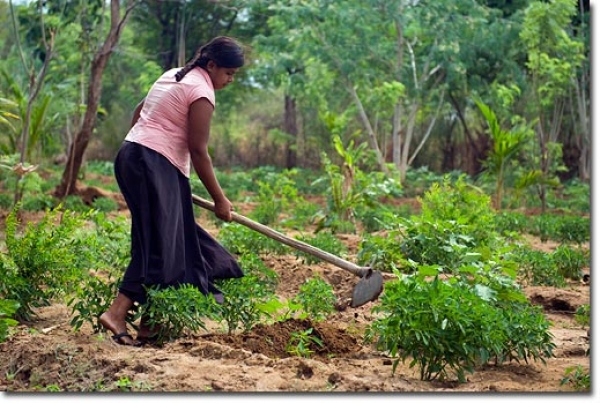
Smallholder Farmers Vulnerable To Climate Change
Sri Lanka and its people are feeling impacts of climate change. With changes in rain intensity, floods and with slow onset impacts of climate change such as droughts, as well as increased temperature levels, and impacts of scarcity of water, or losses due to too much water from floods, we feel the daily impacts of climate change.
These impacts increase already existing vulnerabilities, making those communities already impacts due to social and economic hardships to experience additional burdens. A community that is feeling these impacts is the small holder farmers whose hardships have worsened due increased frequency of flood and droughts. One such example are the farmers living in the Dry Zone of the country.
Impacts on Smallholder Farmers
The variability of the north-east monsoon which supports agriculture in the Dry Zone is evident through the increased number of high rainfall events followed by longer dry spells. Further, rainfall modelling indicate that large areas of the Dry Zone will receive less rainfall in the medium term. These impacts have direct consequences on the Dry Zone farmers. They are ridden with hardships due to lack of water, and the impacts increasing the scarcity creates additional pressure on Dry Zone agricultural households whose lives are already circumscribed by poverty, low incomes, and recovering from three decades of conflict.
The farmers suffer from threats to food security, health and decent livelihood. This is due to decreasing yields in farm fields due to decreased storage capacity, decreased availability of year-round safe drinking water due to longer drought, declining water quality and lack of adequate water storage, as well as increased crop losses and damage to livelihood and assets from severe impacts of climate change.
In order to address these issues, there is need to set up village irrigation systems such as small reservoirs to provide necessary water to small holder famers. In providing water resources, one needs to focus as a priority on small holder farmers who are poorer and more vulnerable than their Dry Zone counterparts who have access to major irrigation. In the case of a delay in monsoon or heavy rainfall during the sowing or harvesting period, there is risk for the entire cropping season to be damaged. And for farmers who cultivate under village irrigation systems, the crop from the Maha Season (NEM) is often their main source of income and household food. And in the event of crop damage, these farmers would be losing their main source of income for the year.
The way to address the risk of lacking sufficient water for agriculture would be to look into options of adaptive measures. This could be done through adaptation actions taken in river basins, and working towards providing smallholder farmers living in the river basins water through improved irrigation.
Actions need to be taken to enhance the lives and livelihoods of the smallholder farmers in the Dry Zone whose economic and social vulnerability are increased due to climate impacts on water and food security. Attention needs to be given to addressing these issues of vulnerable communities suffering from extreme weather events, and slow onset impacts of climate change.
Climate Finance for Sri Lanka
In order to address the situation in which the farmers of the Dry Zone live, actions on adaptation need to be taken. And to do this, there needs to be finance allocations for such actions. In brief, there is a need for climate finance in Sri Lanka, and specifically for adaptation based activities in the agricultural sector.
There remain options for climate finance for developing countries such as the Green Climate Fund (GCF), which was set up as an entity under the financial mechanism of the United Nations Framework Convention on Climate Change (UNFCCC). The GCF provides funding through direct access to developing countries for projects, programmes, policies and other activities. The funding allocation is to be provided in a balanced manner, for both mitigation as well as adaptation activities. The GCF also caters to both public as well as private finance, and has A target set at raising 100 billion dollars a year by 2020.
It is important that countries such as Sri Lanka, needing financing for adaptation efforts such as issues highlighted are able to access funding from the GCF. It is also important that the vulnerabilities of those impacted by climate change are identified, and their resilience is build. For this, the country needs a grant based financing mechanism which recognises the vulnerabilities, impacts, and that will set up concrete adaptation actions on the ground for effective and efficient actions creating change and benefiting those vulnerable to the impacts of climate change.
Source :25/07/2016 Asian Mirror http://www.asianmirror.lk/opinion/item/17290-smallholder-farmers-vulnerable-to-climate-change




